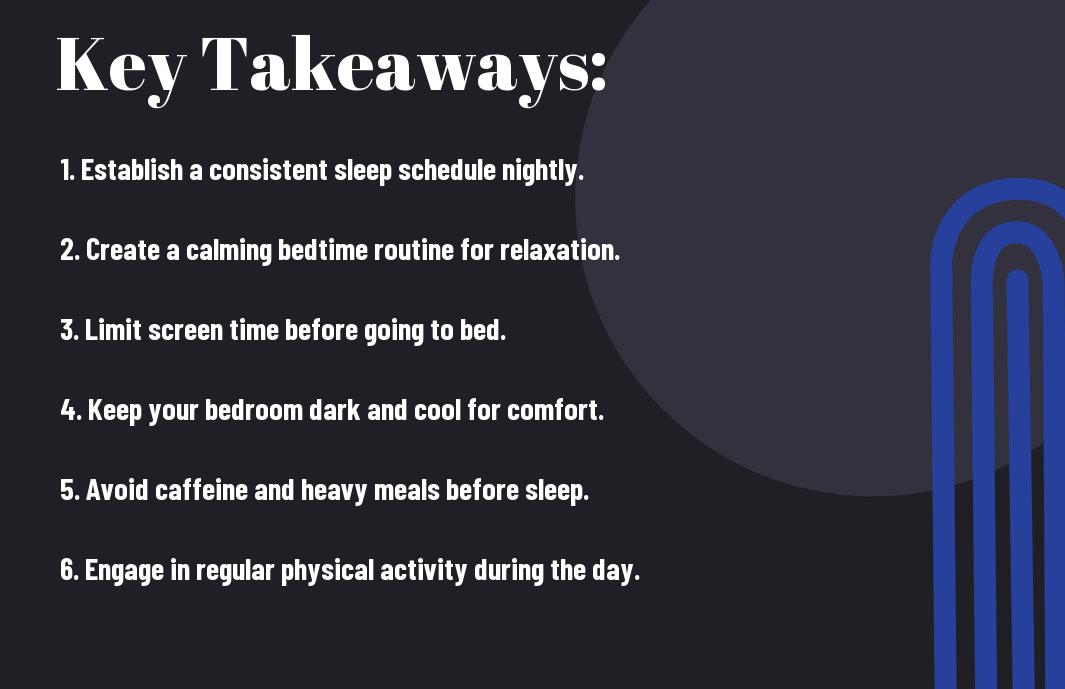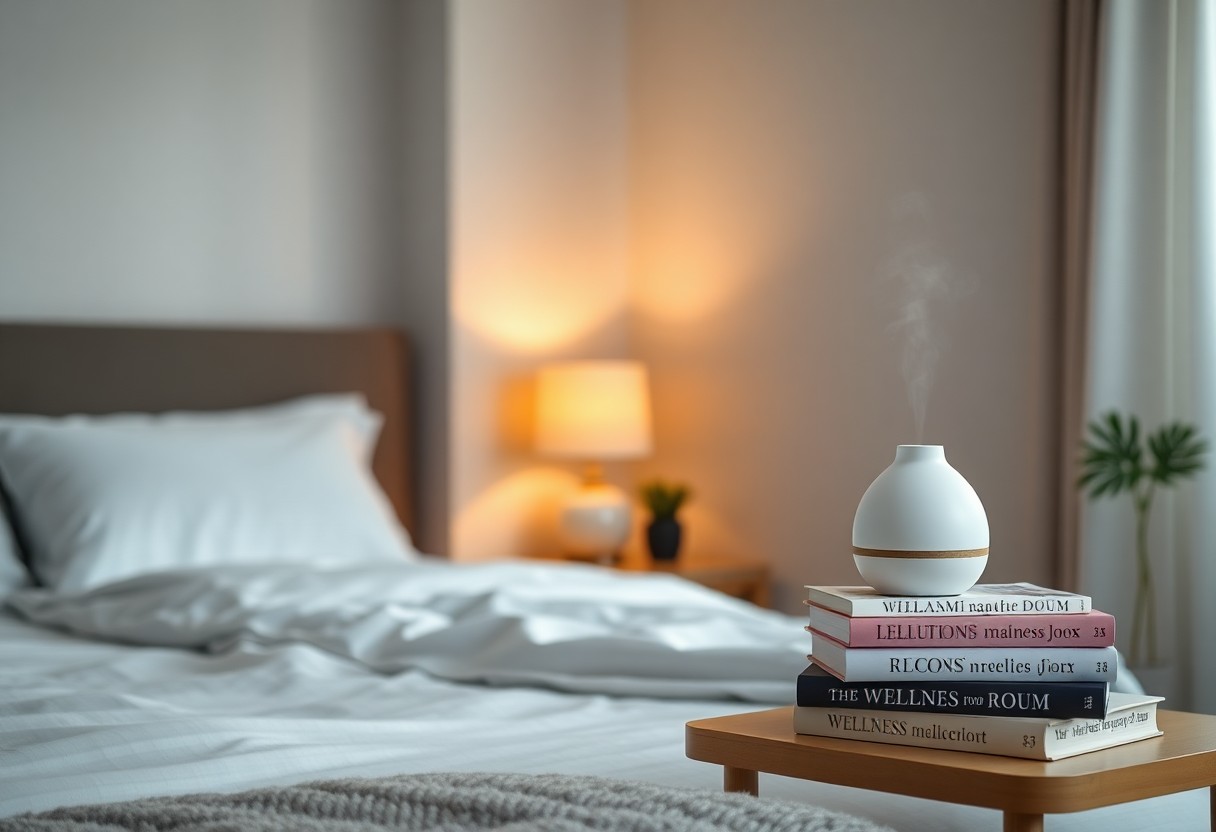Just when you think you’ve tried everything, sleepless nights persist. If you find yourself tossing and turning or staring at the ceiling, you’re not alone. Many struggle with getting the restful sleep they need, but there are practical strategies you can incorporate into your routine to improve your rest. From creating a calming bedtime environment to establishing a consistent sleep schedule, these tips can help enhance your overall sleep quality. Dive into some effective techniques that may help you drift off more easily and wake up feeling refreshed.

Understanding Sleep
Before you can improve your sleep, it’s important to understand its basic functions and how it affects your overall health. Sleep is a natural state of rest for your body and mind, allowing for recovery, memory consolidation, and crucial processes that support physical and mental well-being. By recognizing the significance of quality sleep, you can make informed choices in your quest for better rest.
The Importance of Sleep
Around one-third of your life is spent sleeping, and this time is important for both mental and physical health. Quality sleep supports cognitive function, enhances mood, and strengthens your immune system. By prioritizing sleep, you not only replenish your energy but also optimize your performance in daily tasks, boost creativity, and improve overall quality of life.
Common Sleep Disorders
Around 70 million Americans struggle with sleep disorders, affecting their ability to achieve restful nights. Conditions such as insomnia, sleep apnea, and restless legs syndrome can disrupt sleep patterns and lead to excessive daytime fatigue. Understanding these disorders can help you recognize symptoms and seek appropriate treatment.
A deeper understanding of common sleep disorders like insomnia, which involves difficulty falling or staying asleep, can empower you to address any issues you might face. Sleep apnea, characterized by breathing interruptions during the night, can lead to severe health risks if untreated. Restless legs syndrome causes an uncontrollable urge to move your legs, often disrupting your sleep. Knowing these disorders and their symptoms is the first step toward finding effective solutions and enhancing your sleep quality.
Creating a Sleep-Friendly Environment
Even the most comprehensive sleep routine can fall short without a supportive environment. To enhance your rest, consider your bedroom setup, light levels, and noise control. A calming atmosphere with dim lighting and gentle colors can signal your body that it's time to wind down. Ensure the temperature is comfortable, and keep your bedroom clutter-free to promote relaxation and improve your sleep quality.
Bedroom Setup and Ambiance
Across your bedroom, the elements you choose play a significant role in creating a serene atmosphere. Opt for soft bedding, including comfortable pillows and a supportive mattress, to help you drift off with ease. Incorporating calm colors and personal touches, like calming artwork or plants, can also create a restful vibe.
Technology and Sleep
To achieve better sleep, consider how technology might be affecting your rest. Many devices emit blue light, which can interfere with your body's natural sleep-wake cycle. To promote restful sleep, it's important to minimize screen time before bedtime and perhaps establish a tech-free zone in your bedroom.
Hence, prioritizing your sleep environment means taking technology seriously. Implement strategies like using blue light filters, setting a digital curfew, or replacing screens with calming activities such as reading or listening to soothing music before bed. These adjustments will help signal to your brain that it’s time to relax and prepare for sleep, ultimately enhancing the quality of your rest.
Establishing a Relaxing Bedtime Routine
Not having a consistent bedtime routine can disrupt your sleep quality. To improve your rest, create a calming atmosphere that signals your body it's time to wind down. This might include dimming the lights, lowering the thermostat, or engaging in relaxing activities. Incorporating rituals such as reading a book or taking a warm bath can help ease the transition from day to night, making it easier for you to fall asleep and stay asleep throughout the night.
Pre-Sleep Activities
Bedtime routines should include activities that promote relaxation and signal to your body that it’s time to sleep. Engaging in light stretching, listening to soothing music, or practicing deep breathing exercises can help you unwind. Avoid stimulating activities such as working or using electronic devices, as they can hinder your ability to prepare for rest and make it harder for you to fall asleep quickly.
Mindfulness and Meditation Techniques
By incorporating mindfulness and meditation into your nightly routine, you can significantly enhance your ability to relax before bed. These practices help you focus your thoughts, reduce anxiety, and create a sense of inner peace that can make falling asleep easier.
Mindfulness involves being fully present in the moment, allowing you to let go of the day's stresses. Simple practices, such as guided meditation or breathing exercises, can be performed right before bedtime. You might choose to spend a few minutes visualizing a peaceful scene, or focus on your breath to help calm your mind. Consistency is key; incorporating these techniques into your nightly routine may lead to deeper, more restorative sleep over time.
Dietary and Lifestyle Influences on Sleep
To improve your sleep quality, you need to be mindful of dietary choices and lifestyle habits. Certain foods can promote better rest, while others can disrupt your sleep patterns. Additionally, your daily activities and routines can significantly impact how well you sleep at night. By making some adjustments in these areas, you can cultivate a more restful environment for sleep and optimize your overall health.
Foods to Include or Avoid
One of the simplest ways to enhance your sleep is by adjusting your diet. Foods rich in magnesium and tryptophan, like almonds and turkey, can promote relaxation and help you fall asleep more easily. Conversely, you should avoid caffeine, heavy meals, and alcohol close to bedtime, as they can hinder your ability to sleep soundly.
The Role of Exercise
Along with diet, regular exercise plays a significant role in establishing better sleep patterns. Engaging in physical activities can help regulate your body's circadian rhythms and reduce stress levels, making it easier for you to unwind at night.
At least 30 minutes of moderate exercise most days can lead to improved sleep quality and duration. Activities like walking, swimming, or cycling not only enhance your physical health but also stimulate the release of endorphins, which can elevate your mood and promote relaxation. However, try to finish intense workouts at least a few hours before bedtime, as exercising too close to sleep can have the opposite effect and keep you awake.
Natural Sleep Aids and Remedies
Keep exploring various natural sleep aids that can enhance your nightly rest. One unique suggestion is to try sticking your head in the freezer, as unconventional as it sounds. Additionally, you may find that herbal teas, such as chamomile or valerian root, can effectively promote relaxation and support better sleep. Experimenting with these remedies can help you get the restful nights you deserve.
Herbal Supplements
Along your journey to better sleep, consider incorporating herbal supplements into your nightly routine. Popular options like melatonin, passionflower, and lavender can gently guide your body toward a state of tranquility. Engage with these natural remedies, understanding how they might interact with your body, and always consult a healthcare professional prior to starting any new supplement.
Homeopathic Approaches
Supplements can be beneficial, but many also find homeopathic approaches to be helpful in addressing sleep issues. Homeopathy focuses on using highly diluted substances to stimulate the body's own healing process, making it a gentle option for promoting restful sleep. Remedies like cocculus indicus or chamomilla may alleviate sleep disturbances and foster relaxation. Trust in the natural rhythms of your body while seeking out these alternatives.
The key to effective homeopathic approaches lies in understanding your individual sleep challenges. You may benefit from tailored solutions that specifically address your symptoms and lifestyle. As always, consider consulting a professional homeopath to create a personalized plan that aligns with your needs, helping you achieve the restorative sleep you continue to seek.

When to Seek Professional Help
For those unable to achieve restful sleep despite trying various strategies, seeking professional help may be necessary. Sleep disorders can significantly impact your well-being, and consulting a healthcare professional can provide tailored solutions. Resources like Why Can't I Sleep? 15 Remedies for Insomnia - Health can help you understand when it's vital to reach out for expert assistance.
Signs That Indicate a Problem
Behind your persistent sleep issues, signs may indicate a deeper problem. If you frequently struggle to fall or stay asleep, feel exhausted during the day, or rely on sleep aids, these could be warning signs that professional evaluation is needed. Observing patterns in your sleep and how they affect your daily life can provide valuable insight into whether it’s time to consult a specialist.
Overview of Sleep Studies and Treatments
Above the common remedies, sleep studies and treatments can uncover the underlying causes of your sleep difficulties. Typically, a sleep study involves monitoring your sleep patterns in a controlled environment, providing data that can guide appropriate treatment options tailored to your specific needs.
Signs of a sleep disorder can lead to comprehensive evaluations, including polysomnography or at-home sleep tests. Treatments vary, ranging from cognitive behavioral therapy for insomnia (CBT-I) to lifestyle adjustments and medication, all aimed at addressing your unique situation. Identifying the right approach requires an open dialogue with your healthcare provider to optimize your sleep quality effectively.
Conclusion
With this in mind, improving your sleep quality is attainable by implementing practical strategies tailored to your needs. From establishing a bedtime routine to creating a comfortable sleep environment, the steps you take can lead to more restful nights. If you're looking for additional insights, check out Can't sleep? Try these tips Information. Prioritize your sleep—it has a significant impact on your overall well-being.
Q: What are some effective tips to fall asleep faster?
A: To fall asleep faster, establish a relaxing bedtime routine to signal your body that it’s time to wind down. Reduce screen time at least an hour before bed as the blue light emitted can interfere with sleep. Keep your bedroom cool, dark, and quiet to create a suitable sleep environment. Engaging in gentle activities like reading or meditation before bed may also help ease your mind.
Q: How does caffeine affect sleep quality?
A: Caffeine is a stimulant that can disrupt sleep patterns. Consuming caffeinated beverages in the afternoon or evening can make it harder to fall asleep and can lead to lighter sleep cycles throughout the night. It’s advisable to limit caffeine intake at least 6 hours before bedtime for better sleep quality.
Q: What role does exercise play in improving sleep?
A: Regular physical activity can enhance sleep quality and help you fall asleep more quickly. Exercise reduces stress and anxiety, both of which can interfere with restful sleep. However, try to complete any vigorous exercise at least a few hours before bedtime to avoid overstimulation, which might hinder your ability to sleep.
Q: Are there specific dietary choices that can help with sleep?
A: Yes, certain foods can promote better sleep. Incorporating foods rich in magnesium, such as nuts and leafy greens, can support muscle relaxation. Foods high in tryptophan, like turkey and dairy, can help produce serotonin and melatonin, which regulate sleep. Avoid heavy meals, spicy foods, and excessive sugar close to bedtime as they may cause discomfort or wakefulness.
Q: How can relaxation techniques improve sleep?
A: Relaxation techniques, such as deep breathing, progressive muscle relaxation, or visualization, can calm the mind and body, making it easier to transition to sleep. These practices can reduce anxiety and stress levels, allowing your body to naturally prepare for rest. Integrating these techniques into your nightly routine can significantly improve your sleep quality over time.


0 Comments